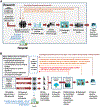Ethical Issues Posed by Field Research Using Highly Portable and Cloud-Enabled Neuroimaging
- PMID: 32135089
- PMCID: PMC8803403
- DOI: 10.1016/j.neuron.2020.01.041
Ethical Issues Posed by Field Research Using Highly Portable and Cloud-Enabled Neuroimaging
Abstract
Highly portable, cloud-enabled neuroimaging technologies will fundamentally change neuroimaging research. Instead of participants traveling to the scanner, the scanner will now come to them. Field-based brain imaging research, including populations underrepresented in neuroscience research to date, will enlarge and diversify databases and pave the way for clinical and direct-to-consumer (DTC) applications. Yet these technological developments urgently require analysis of their ethical, legal, and social implications (ELSI). No consensus ethical frameworks for mobile neuroimaging exist, and existing policies for traditional MRI research are inadequate. Based on literature review and ethics analysis of neurotechnology development efforts, Shen et al. identify seven foundational, yet unresolved, ELSI issues posed by portable neuroimaging: (1) informed consent; (2) privacy; (3) capacity to accurately communicate neuroimaging results to remote participants; (4) extensive reliance on cloud-based artificial intelligence (AI) for data analysis; (5) potential bias of interpretive algorithms in diverse populations; (6) return of research results and incidental (or secondary) findings to research participants; and (7) responding to participant requests for access to their data. The article proposes a path forward to address these urgent issues.
Keywords: EEG; MEG; MRI; PET; artificial intelligence; bias; bioethics; diverse populations; fMRI; fNIRS; informed consent; neuroethics; neuroimaging; privacy; research ethics; return of results.
Copyright © 2020. Published by Elsevier Inc.
Figures

References
-
- Kulynych JJ (2007). The regulation of MR neuroimaging research: disentangling the Gordian knot. Am. J. Law Med. 33, 295–317. - PubMed
-
- National Institutes of Health (2019). The BRAIN Initiative and neuroethics: enabling and enhancing neuroscience advances for Society. https://braininitiative.nih.gov/strategic-planning/acdworking-groups/bra.... - PubMed
-
- Racine E, and Illes J (2007). Emerging ethical challenges in advanced neuroimaging research: review, recommendations and research agenda. J. Empir. Res. Hum. Res. Ethics 2, 1–10. - PubMed
Publication types
MeSH terms
Grants and funding
LinkOut - more resources
Full Text Sources

